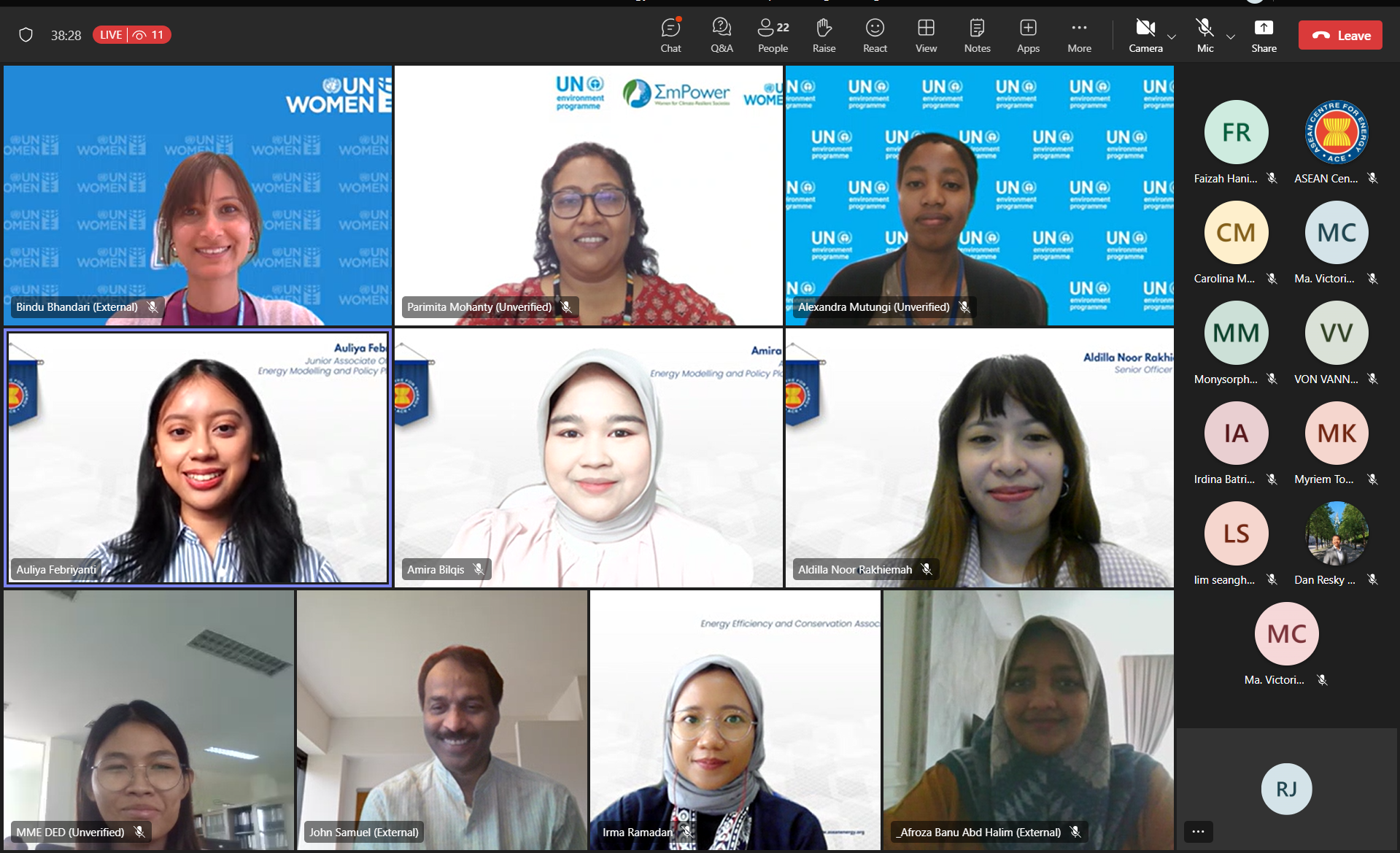Menu

Photo 1. Photo Session with Speakers and ASEAN Member States (AMS)
On 29 May 2024, the ASEAN Centre for Energy (ACE) hosted the ASEAN Renewable Energy and Gender Roadmap: Learning Exchange, with the theme of “Strategic Approaches to Gender Mainstreaming in ASEAN Energy Policy: Road to New Phase of ASEAN Plan of Action for Energy Cooperation (APAEC).” The event was held virtually and attended by around 20 participants across ASEAN energy officials to learn best practices and discuss the vision the energy-gender nexus in their respective policies. The learning exchange aims to raise awareness and delve into mainstreaming gender in the regional energy policy across ASEAN countries.
To officially commence the learning exchange, Dr. Parimita Mohanty, Program Manager Officer of UNEP, expressed gratitude to ASEAN Focal Points for working towards implementing the ASEAN Plan of Action for Energy Cooperation (APAEC). However, the gender gap in the region and the Just Energy Transition (JET) are crucial for addressing the climate crisis while ensuring women and marginalised groups. Followed by the opening remarks from Dr. Zulfikar Yurnaidi, Manager of Energy Modelling and Policy Planning (MPP) Department at ASEAN Centre for Energy (ACE), that highlighted the importance of realising the shared vision of inclusive energy transition through the ASEAN Renewable Energy-Gender Roadmap—the first social approach roadmap produced by ACE.
The first learning exchange session was dedicated to the recall of the ASEAN RE-Gender Roadmap by Amira Bilqis, Research Analyst of MPP at ACE. She laid out ASEAN’s commitments towards Just and Inclusive Energy Transition under the Joint Ministerial Statement (JMS) Framework, particularly ACE’s continuous contribution to energy-gender studies. Amira also highlighted how ASEAN requires concerted efforts to provide enabling environments and that ACE is currently pre-assessing the challenges to adopting gender inclusion in the energy transition policy survey.
Following the scene setting, Amira moderated the Panel Session to discuss the inclusive decision-making of gender mainstreaming in the regional and national energy transition policy.

Photo 2. Panellist Session
The first speaker, Aldilla Rakhiemah, Senior Officer of Power, Fossil Fuel, Alternative Energy and Storage (PFS) Department, added the current progress on advocating regional energy policymaking processes for the next cycle of APAEC post-2025. She also introduced how the ASEAN Climate Change and Energy Project (ACCEPT) supports gender equality in the energy sector. Finally, she highlighted the absence of gender-specific data in the energy sector, which led to insufficient gender analysis.
This followed by John Samuel, Regional Director of Oxfam in Asia, presented how the current energy transition policy put gender and marginalised group left behind, thereby the importance of inclusive decision-making for just energy transition is important. Limited land and capital access has hindered women’s ability to adapt to climate change, although they tend to be more open about climate issues. He also mentioned Oxfam partnership with civil society, government, and multilateral organisations to work on just energy transitions in Southeast Asia.
As mentioned regarding the need for gender-disaggregated data, Bindu Bhandari, Program Analyst (Gender and Climate) from UN Women, shared details on the Data Collection and Analysis Tools in Energy-gender. She highlighted UN Women’s studies related to gender and energy, including the ASEAN Gender Outlook 2021 and the forthcoming edition. She also shared a Model Questionnaire to help countries collect data on the gender-environment nexus design for national surveys.
Last Alexandra Mutungi, Gender and Climate Change Specialist at UNEP, highlighted how women often do not receive sufficient access to financial institutions and explored EmPower projects to promote gender-responsive finance. By working with financial institutions, UNEP tried to create an enabling environment for women’s leadership in renewable energy entrepreneurship. Moreover, she underscored financial institutions engaging for sustained outcomes using Environmental, Social, and Governance (ESG) Guidance Note for financial institutions to screen start-ups.
In the final discussion, Amira called on ASEAN Member States (AMS) to exchange insights on their respective gender mainstreaming practices in energy policy. Focal Points from the Philippines shared work on gender analysis and data with the Department of Energy Gender and Development (DOE-GAD). The Philippines also added the need for capacity building to update and monitor the gender-disaggregated data collection.
Stay connected with us to follow our journey in supporting ASEAN on the energy-gender nexus. We commit to delving into the dynamic interplay between energy policies and gender equality across the ASEAN region through continuous studies.
